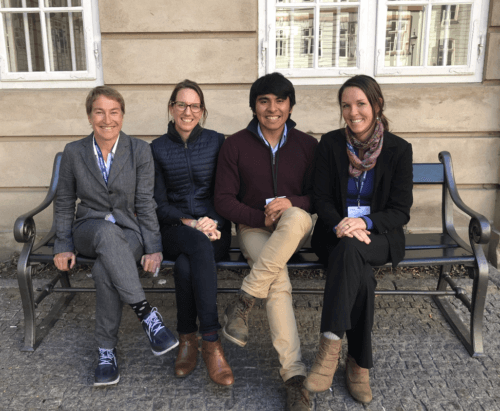Future Earth and the UN Decade of Ocean Science for Sustainable Development
Anticipation mounted and lively, enthusiastic energy filled the National Museum of Denmark as ocean stakeholders from across the world convened for the 1st Global Planning Meeting for the UN Decade of Ocean Science for Sustainable Development in mid May. Over 200 participants, representing research institutions and UN organizations, but also business, technology, NGOs, philanthropy and communication organizations, came together focused on a shared interest, our global ocean. Since the ocean and the services it provides are essential for humanity, it is key to achieving nearly all the UN Sustainable Development Goals (SDGs). Thus, the goal of the meeting was to establish a common vision and narrative for the Ocean Decade and to identify the ocean knowledge needed to fully support sustainable development efforts. Meeting organizers highlighted six key societal objectives as the backbone of the Ocean Decade, including a: (1) clean ocean, (2) healthy ocean, (3) predicted ocean, (4) safe ocean, (5) sustainably harvested and productive ocean, and (6) transparent and accessible ocean. One of the key themes that emerged throughout the discussions as a cross-cutting and linking theme was that diverse partnerships and participation will be essential to all aspects of the Ocean Decade. Thus, fostering partnerships on many different axes of diversity is vital to movements like the Ocean Decade and solutions addressing the SDGs.

One common theme that emerged throughout the meeting was diversity. In this article we focus on several aspects of stakeholder diversity that consistently arose throughout the Ocean Decade planning meeting: geographic, sectoral/discipline, and intergenerational, gender and race/ethnicity. The global ocean connects people from around the world, and the Ocean Decade will only be successful if it includes women and men from many different regions, cultures, and backgrounds, particularly if it can include people, needs, and knowledge from the global South, which is typically underrepresented. It will be particularly important to take into account the different ways in which men and women in the global South use and view the ocean. As such, cross-cutting concepts of meaningful capacity building and knowledge and technology transfer between the global North and the global South emerged as essential components of many of the discussions and key steps forward.
In addition, since the Ocean Decade is centered around ocean science for sustainable development, including ocean stakeholders from a variety of sectors and disciplines is vital to the process. The presence of private sector and ocean sporting stakeholders at the Global Planning Meeting was a positive first step that needs to be continued. This will be important in order to build a knowledge base and decision-support tools that are holistic and integrate the complex considerations of the interdependent social and ecological systems that we rely on. To achieve it, developing systems and processes that facilitate participation and transdisciplinary communication will be essential. In addition, greater communication among diverse stakeholders will ensure that knowledge can be effectively translated to action in the hands of decision makers.
Finally, since we want to ensure sustained action over the timeframe of the Ocean Decade, 2021-2030, and beyond, intergenerational diversity is vital to ensure a sustainable ocean future. As early-career professionals at the meeting, we felt that this was an area that we could contribute to. Thus, we engaged with the other Early Career Ocean Professionals who were present at the meeting and delivered a coordinated message to the Executive Planning Group for the Decade and to all the attendees. We proposed a partnership between Early Career Ocean Professionals and many of the current ocean leaders to ensure not only the success of the Decade, but its continuation beyond 2030, as we think that sustainability is not a destination, but an intergenerational journey.
Based on this opportunity to engage more people in the Ocean Decade, we think that one of the key roles that Future Earth and the Ocean Knowledge-Action Network (KAN) can play is to facilitate active participation of a diversity of stakeholders. Specifically, we would like to support Early Career Ocean Professionals in all aspects of the Ocean Decade process. For example, we plan to help early-career professionals understand how to become involved in the planning meetings, how to engage with Ocean Decade organizers, and how to lead meetings that will contribute to the science and sustainable development goals of the Decade. By doing this, we hope to meaningfully contribute to the extended success of the efforts that officially kicked off this May in Copenhagen.
As the Ocean Decade gains momentum, a surge of enthusiasm and energy is mounting. Diverse participation, leveraging existing networks, and building novel partnerships are essential aspects of the Decade to ensure that ocean science is relevant and applicable to our most pressing and complex societal concerns. If you would like to contribute to the continued planning discussion there will be a series of regional planning meetings over the next year, so please stay tuned for announcements. In addition, the Ocean Decade is a movement that requires participation from the diverse set of people who have any stake in the ocean; since the ocean is a vital life support system for all of humanity, this can include all of us. We look forward to embarking on this journey as a global team working toward a sustainable ocean future. We encourage you to reflect on how would you like to participate and begin contributing to the swell of the Ocean Decade.
DATE
June 12, 2019AUTHOR
Alfredo GironAlison Clausen
Anna Zivian
Erin Satterthwaite
SHARE WITH YOUR NETWORK
RELATED POSTS
Future Earth Members Join UN Ocean Conference in Barcelona
SOLAS Researchers Publish Special Feature on Air-Sea Interface in Changing Climate
Building a Knowledge Action Network In the Indigenous Communities of the South Pacific